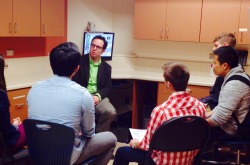Speed dating in the name of research

Whether it’s done in a lab or a clinic, from pharmaceutical sciences to health outcomes to pharmacy practice to teaching and learning – the research conducted in the School of Pharmacy is diverse.
Students are obviously eager to learn about the range of possibilities in a pharmacy research career - the proof lies in the 47 faces who came out after class time on Nov 20, to learn about their professor’s research during the school’s first Research Speed Dating Forum.
Faculty members were perched at seven stations, with eight small groups of students rotating between all stations. In seven minutes, each researcher gave a five-minute crash course in a research project they were currently involved in. Two minutes were allotted at the end of each presentation to allow for Q&A.
The idea came to two fourth year students who attended the school’s strategic planning retreat this summer.
“It kept getting raised that there isn’t a huge interest from the undergrad students to get involved with research,” said Janice Coleman (Class of 2015), who co-initiated the event with her classmate Nicole MacDonald. “We thought this would be a fun way to promote research and show that there is a lot more to it than we think!”
Dr. Laurie Twells worked with the students to plan and execute the event. She noted that the approach is mutually beneficial to both students and faculty.
“The approach allows students and faculty to discuss research in a very informal and fun way,” she said. “Giving faculty just five to six minutes to talk about their own research encourages them to focus on the relevant and exciting projects they have underway, giving students exposure to the diverse skill set and research interests within the School.”
In most undergraduate programs, students are not exposed to research in the early years of the program and may not always be aware of the kinds of projects being conducted in their own departments, or which funding opportunities are available for undergraduate students.
In response to this, the School of Pharmacy is exploring ways to incorporate research earlier into the undergraduate degree as the new doctor of pharmacy (PharmD) degree is developed. The program is anticipated to admit its first class in the fall 2017 semester.
The school has also developed an internal database of undergraduate research funding opportunities.
Although she previously had no interest in research, Ms. MacDonald now says she has a serious interest in studying therapeutic options for efficacy in different patient populations after she graduates.
“I was involved in a research project this past summer that compared two drugs used for anticoagulation in patients who have undergone a total hip or knee replacement and found it very interesting,” she said. “In the future, I’d like to get involved in projects that focus on the geriatric population.”
Ms. Coleman said she previously associated research with drug development, but now realizes that research covers a broad spectrum and can support an expanded scope of practice for pharmacy – an area she strives to explore.
Dr. Carlo Marra, dean, agreed that as pharmacists are granted expanded scopes of practice, evaluating how pharmacist services impact patient health outcomes and if these services are good value for money is vital.
“Practice-based research can provide the tools and evidence by which new services and methods can be operationalized by the health care system to be integrated to improve efficiencies,” he said.